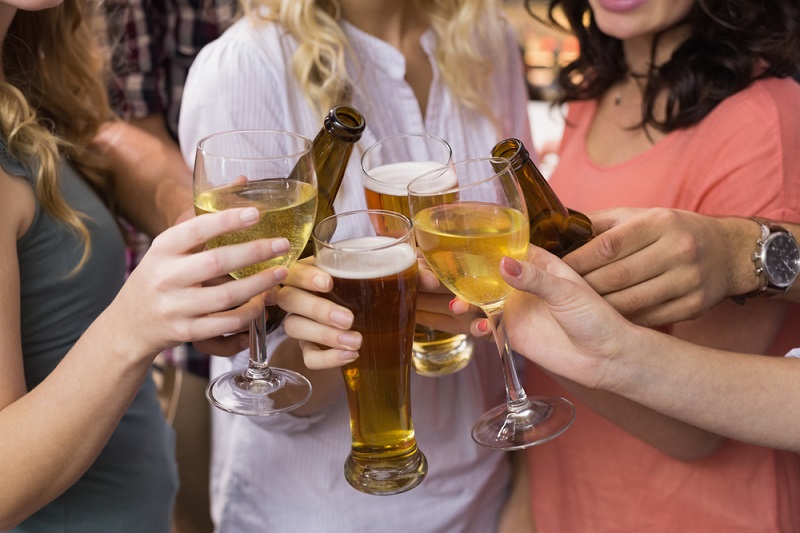No, Drinking 'Beer Before Wine' Won't Prevent a Hangover, Study Finds

Get the world’s most fascinating discoveries delivered straight to your inbox.
You are now subscribed
Your newsletter sign-up was successful
Want to add more newsletters?

Delivered Daily
Daily Newsletter
Sign up for the latest discoveries, groundbreaking research and fascinating breakthroughs that impact you and the wider world direct to your inbox.

Once a week
Life's Little Mysteries
Feed your curiosity with an exclusive mystery every week, solved with science and delivered direct to your inbox before it's seen anywhere else.

Once a week
How It Works
Sign up to our free science & technology newsletter for your weekly fix of fascinating articles, quick quizzes, amazing images, and more

Delivered daily
Space.com Newsletter
Breaking space news, the latest updates on rocket launches, skywatching events and more!

Once a month
Watch This Space
Sign up to our monthly entertainment newsletter to keep up with all our coverage of the latest sci-fi and space movies, tv shows, games and books.

Once a week
Night Sky This Week
Discover this week's must-see night sky events, moon phases, and stunning astrophotos. Sign up for our skywatching newsletter and explore the universe with us!
Join the club
Get full access to premium articles, exclusive features and a growing list of member rewards.
The adage, "beer before wine and you'll feel fine, wine before beer and you'll feel queer" doesn't hold up to scientific scrutiny. A new study finds that the order in which you consume alcoholic drinks won't actually help you avoid a hangover.
Rather, drinking too much alcohol of any kind — and in any order — will likely give you a hangover, the study researchers conclude.
"We didn't find any truth in the idea that drinking beer before wine gives you a milder hangover than the other way around," lead study author Jöran Köchling, of Witten/Herdecke University in Germany, said in a statement. "The truth is that drinking too much of any alcoholic drink is likely to result in a hangover." [11 Interesting Facts About Hangovers]
The study is published yesterday (Feb. 7) in the American Journal of Clinical Nutrition.
Putting proverbs to the test
There is no medically proven way to prevent or treat a hangover — the symptoms of headache, nausea and fatigue that come with drinking too much alcohol. Instead, people sometimes rely on such unproven folk sayings as "wine before beer"; or "grape or grain but never the twain"; or "beer before liquor, never been sicker." Similar folk wisdom on the ordering of wine and beer exist in other languages, including German and French.
The new study put these proverbs to the test. The researchers recruited 90 healthy volunteers ages 19 to 40 who agreed to down large amounts of alcohol, for science.
The participants were divided into three groups. The first group consumed about two and a half pints of beer (with an alcohol content of 5 percent each) followed by four large glasses of wine (with an alcohol content of 11 percent each). The second group consumed the same amount of alcohol, but in reverse order (wine followed by beer). The third group drank only beer or only wine. During the drinking task, the participants were asked to rate their perceived level of drunkness.
Get the world’s most fascinating discoveries delivered straight to your inbox.
Afterwards, they spent the night at the study site under medical supervision. The next day, participants were asked about their hangover symptoms; and they were given a score based on the number and severity of those symptoms, such as thirst, fatigue, headache, dizziness, nausea, stomach ache, increased heart rate and loss of appetite.
A week later, the participants came back to the study site to perform the drinking task again, but participants in groups one and two were switched to the opposite drinking order. (Those who consumed beer first on the initial visit consumed wine first on the second visit, and vice versa.) Participants in the third group who drank only beer on the first visit drank only wine on the second visit, and vice versa. This way, the researchers could compare the reactions of each individual to the same person's earlier experience. (In other words, each person served as their own "control."
The researchers found that participants in all three groups had similar hangover scores.
"Unfortunately, we found that there was no way to avoid the inevitable hangover just by favouring one order over another," senior study author Dr. Kai Hensel, a senior clinical fellow at the University of Cambridge in the United Kingdom, said in the statement.
Only two factors predicted the severity of a person's hangover: that person's "perceived drunkenness" score and whether the person vomited after the drinking task. (Higher perceived drunkenness scores and vomiting were both tied to more severe hangovers.)
"The only reliable way of predicting how miserable you'll feel the next day is by how drunk you feel and whether you are sick. We should all pay attention to these red flags when drinking," Köchling said.
The researchers note that the study used only lager beer and white wine, so it's unclear if the results apply to other types of alcohol.
- 7 Ways Alcohol Affects Your Health
- Raise Your Glass: 10 Intoxicating Beer Facts
- Cheers? Counting the Calories in Alcoholic Drinks
Originally published on Live Science.

Rachael is a Live Science contributor, and was a former channel editor and senior writer for Live Science between 2010 and 2022. She has a master's degree in journalism from New York University's Science, Health and Environmental Reporting Program. She also holds a B.S. in molecular biology and an M.S. in biology from the University of California, San Diego. Her work has appeared in Scienceline, The Washington Post and Scientific American.
 Live Science Plus
Live Science Plus










